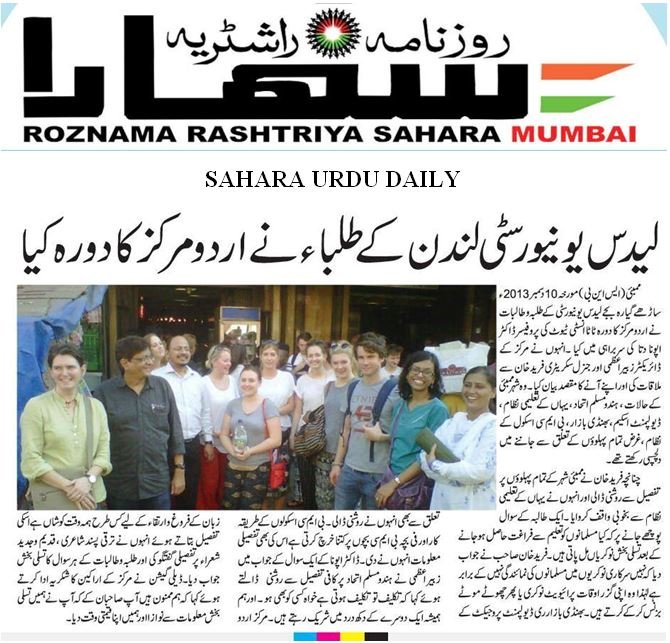The 'impact' of student field trips: Some post-REF reflections
The past year or so has been very hectic in UK Higher Education institutions. The deadline for the dreaded Research Excellence Framework (REF) through which university funding and the fate of academic careers get measured was on 31st October 2013. The REF documentation is long and complicated and involves making entries against a number of criteria that includes (among other things) research outputs (publications), research culture and 'impact'. Impact in recent years has become the most dreaded and controversial concept that has taken over both the REF documentation as well as Research Council funding. the most crucial element of impact is not just that our research has an impact, but that we also have to prove that it has. The latter part is what makes academics cringe - for how do you 'prove' impact when you deal with ideas and concepts? There have been a number of debates around this question of impact from institutions like the LSEImpactblog debating the challenges of 'measuring' the intangible nature of impact.My experience tells me that field trips make an important 'impact' and should be counted as such. It has been a busy 365 days for me in 2013, no less because of the number of research, writing, and lecturing invitations I took up, but also because I took on with another colleague, the conceptualization, planning and organization of a six-day field trip for our students. This inaugural field trip offered for the first time to level 3 students in BA Human geography, was on the theme of 'Global cities', with Mumbai as its destination (see here for slideshow of field trip images). A city like Mumbai presents a rich laboratory for exploring any of the themes on citizenship, identity, migration, belonging, transnationalism, social justice, bourgeois environmentalism, everyday urban politics and so on - seen in the number of student field trips (Geography and other social science disciplines) that are currently visiting the city both from UK and internationally. For each day, we used a specific theme to explore key questions and debates through our 'embodied presence' in different sites across Mumbai, while allocating some time for the students to also work on their own in groups to complete their assessments. One of the assessments was a visual essay. This was a first for the students, and it took them out of their comfort zones to not only learn new skills but also make a visual argument through their own embodied experiences and observations on Mumbai. Now that we have all returned (despite the numerous things that could have gone wrong based on our risk assessment and ethics forms) it is fair to say that this inaugural field trip has been successful. However, since I have had some time for reflection in the new year, I think field trips are crucially also a 'measure' of intellectual dialogue and development not just for the faculty and students but also for wider society.For sure, one can say that all teaching has impact, however I think the field trip should be seen as one deserving a special mention. The impacts of a field trip are both long and short-term, but they are also quite distinct from generic teaching per se. Raising the profile of education research reported in LSEImpactBlog has published several online blogs on the importance of teaching as a form of impact. Peter Wade for example notes that 'the REF's narrow definition of impact rules out the historical role of teaching in relation to the social role of the university (see here). John Parkinson write specifically that the current 'impact' agenda should consider the impact of inspirational teaching (see here). Most important CSID prepared 56 indicators of impact as alternatives for the REF exercise, which when mapped onto field trips provide a compelling argument of considering this as an important space for impact generation.Here are the few different ways that I think field trips make an impact and should be counted and rewarded by REF or any other form of banal measuring system that decides the 'winners' and 'losers' in the academic (increasingly neoliberal) marketplace.
- Research-led teaching as impact: This is self-explanatory. For me personally, organizing the Mumbai field trip was a direct impact of my research into pedagogy. This was one of the modules where I loved doing the lectures to prepare the students for what they would encounter in Mumbai and then taking them to a city which I am in love with professionally and personally.
- Intellectual dialogue and development as impact: There is no other 'Eureka' moment than when you see your students equally (if not more ) interested in a theme or a city that is close to your heart. True it is easy to feel anxious when you are taking a number of students for whom you are technically responsible. Taking students to my own research field helped me see my work in a different light. Students asked me questions about things they saw, which to me were routine, and when I found answers to them it helped me reflect upon my own biases and insider/outsider paradoxes. This is a continuous process, which has continued after return and beyond.
- Developing student research and employability skills as impact: Many students who become interested in particular themes of sites during fieldwork pick up these topics for PhD or become interested in employment in issues dealing with debates covered in field trips.
- Internationalization as impact: In an era where several universities are either closing down their field trip provisions or reducing them to UK/EU destinations, the inaugural Mumbai field trip bodes well for the aspirations of 'internationalization' of universities. This is a different kind of impact from the 'international' courses on the global south that most universities offer - the impact is evident in the actual 'learning by doing' nature of field trips that raise the profile of Universities and departments which offer these.
- Creative outcomes as impact: When arguments are made about including teaching as impact less focus is given also on the outcomes of teaching. By this, I mean the impact that the assignments which students do during/based on the field trip. Often field trip reflective logs are used in pedagogic research, but I think the potential could be exploited much further to include outcomes which have wider societal impact. This year students are making a visual essay as part of their assessment, and these will be screened at a special event in the School. Not only that, the best essays will be showcased during School Open Days and potentially also on the School webpages. As online visual pieces, they will be open access and hence their impact will potentially be on a completely different scale than conventional academic journal articles. So watch this space.
- Media mentions as impact: Our visit to an Urdu School in Mumbai was reported in Sahara, India's leading Urdu newspaper. This is the stuff that REF celebrates as impact, and although it is not about conventional research, I see our presence in the media as an important transgression of pedagogy into the realm of local language media and arguably higher 'impact' than English language based Anglo-American open access journals.

In an era when academics are expected to be REF and teaching and outreach stars simultaneously and take on various other avatars as well, can we reflect upon some of things we actually do and do relatively well such as the student field trips as 'impact'? Is there for us as academics a scope for corrupting the notion of impact by planning and organizing student field trips, particularly those of an international nature?(an edited version of this blog was republished in Guardian Higher Education on 7th January 2014)

